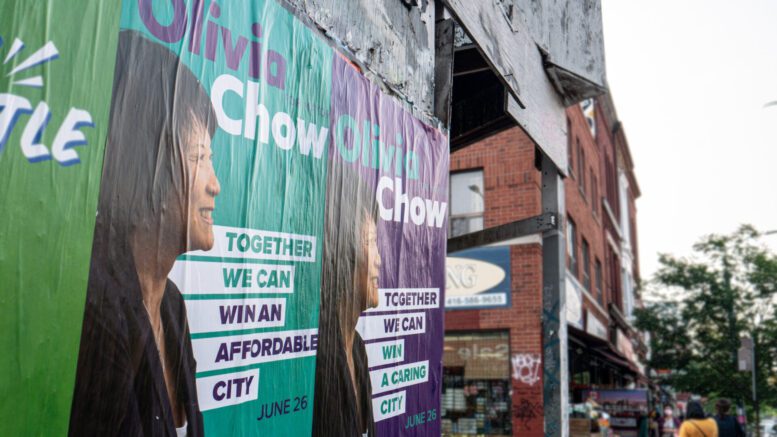Top mayoral bet Olivia Chow has been facing anti-Asian “red-tagging” attacks on social media ahead of Toronto’s June 26 byelection.
Chow has maintained a significant lead in the polls for weeks now. As of June 20, Chow had between 30 to 38 per cent of the projected vote, with less than a week to go until election day.
Former police chief Mark Saunders was second with 14 per cent, followed by Ana Bailão, with 12 per cent of the projected vote.
In the past month, social media has been the main avenue for misinformed attacks on Chow that accuse her of having ties to the Chinese Communist Party (CCP).
Red-tagging is not a new tactic in Canadian politics — it’s a form of anti-Asian racism that reduces the competency of a public official down to false allegations.
Red-tagging has historically been used as a scare tactic in politics. It involves the “tagging” of individuals as either communists, communist sympathizers, terrorists, or having underlying allegiances against the state, all often without substantial proof.
“This is something that has been happening going as far back as the Cold War, and so this has been decades of — especially in the Canadian context — no matter your politics, no matter your record, or your experience, a politician who is Asian runs the risk of being perceived as duplicitous, as potentially having allegiance elsewhere,” said Laura Kwak, PhD, an associate professor of the graduate program in socio-legal studies at York University.
“So, you are an enemy because of your racial identity,” she said.
The history of red-tagging
Red scare politics emerged in 1917 towards the end of World War I and following the Russian Revolution, which saw the Russian Social-Democratic Workers’ Party overthrow their imperial government.
Its emergence is known as the First Red Scare, as it sparked a sense of fear in the United States knowing that a labour-led revolution could take control of a government, which led their state forces to intensely crack down on people who were feared to have allegiance against their government.
Canada eventually caught on to the same sentiments, after having been an ally to the U.S. during the Cold War, the historical period that began at the end of World War II in 1947 and ended after the fall of the Soviet Union in 1991.
During the 1940s and 1950s, Canada sought to weaponize red-tagging due to its allyship with the U.S. and to aid the emergence of the Second Red Scare, when the Americans feared the rise of the CCP and its former alliance with the Soviet Union.
Examples of red-tagging in Canada
In 1957, Douglas Jung was elected as the first Chinese-Canadian member of Parliament, and he was one of the first politicians documented to have experienced racialized red-tagging.
“He experienced the same thing … no matter how much he demonstrated his credentials, no matter how much he devoted himself to public service,” said Kwak. “This was a time wherein, just 10 years before he was elected, they were debating in the house whether or not to even allow Asians to become politicians, because there was exactly this fear.”
Decades later, the anti-Asian sentiment behind racialized red-tagging still continues and has surfaced during this municipal election season.
According to a recent statement from the Chinese Canadian National Council for Social Justice (CCNC-SJ) regarding foreign interference and in response to the red-tagging against Chow, “negative views about China can contribute to more racism against Chinese Canadians, but do not equate or confuse anti-China with anti-Chinese.”
The pandemic’s effect on anti-Asian racism
Racially motivated attacks targeting Asian Canadians have become significantly more prevalent in the past several years, especially at the height of the COVID-19 pandemic. According to Statistics Canada, there was a 301 per cent increase in police-reported hate crimes against Asians, from 67 incidents in 2019 to 269 incidents in 2020.
Several Chinese Canadian politicians have recently been red-tagged and accused of being involved in foreign interference, following leaked reports from the Canadian Security Intelligence Service (CSIS) framing China as having meddled with the 2019 and 2021 federal elections.
In March, Liberal MP Han Dong of Don Valley North received death threats as a result of the CSIS reports accusing him of affiliation, to which he denied, saying the accusations were “unverified.”
Chow has been an active political force in the city and for the city for nearly four decades — having previously served as a trustee on the Toronto District School Board (TDSB), city councillor, a member of Toronto’s budget committee and a member of Parliament.
“She’s [Chow] dedicated herself to political service and even with that, because of her race, she’s reduced to these baseless accusations, and it’s not new,” added Laura Kwak.
“These [attacks] are incredibly harmful, because then people are not engaging with the candidate’s platforms and what they’ve done for the city, what they’ve done for the province and in the work that they have done as an activist and an advocate,” she said.
The Toronto Observer reached out to Chow and her team for a comment, but she did not immediately respond.


